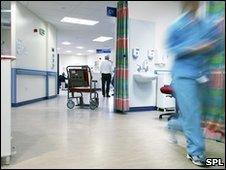Scotland's NHS could see thousands of posts go
- Published
The NHS in Scotland is forecasting it could lose the equivalent of 3,790 full time staff over the next year.
The figure includes 1,523 nursing and midwifery posts and 1,053 administration service jobs.
The workforce projections have been published following pressure from opposition parties at Holyrood.
Health Secretary Nicola Sturgeon said there would be no compulsory redundancies and the figures "were not set in stone".
She added that patient care was paramount, despite a squeeze on NHS budgets.
Ms Sturgeon made the statement after Labour demanded publication of full details of NHS job cuts.
Scotland's largest health board, NHS Greater Glasgow and Clyde, had previously confirmed plans to cut staffing by 1,252 by 2013.
Nursing posts
Opposition MSPs also claimed post reductions were on the way at health authorities across Scotland.
Ministers said NHS spending this year had increased by £264m.
This was despite, the Scottish government said, a £500m "cut" by the last UK government.
Labour said more than half the reductions in the Greater Glasgow area were nursing posts, and further said health chiefs in Lothian were axing 700 jobs, with 500 going in Tayside, almost 600 in Grampian and 100 in Highland.
After publishing the projections, Ms Sturgeon said: "The NHS always has been, and remains, a top priority for this government. We have demonstrated our commitment to the NHS through our actions - despite a £500m cut in the overall Scottish budget, the NHS received a real terms funding increase.
"But the reality is that NHS budgets are tight and will continue to be so for the foreseeable future. It is my job to ensure the NHS delivers the best quality of care, manages the financial challenges facing it, and takes the right decisions now to secure services in the future."
Labour health spokeswoman Jackie Baillie called on ministers to immediately publish workforce planning projections for all Scottish health boards, as she launched the party's "more Nats fewer nurses" campaign.
"You simply cannot remove thousands of doctors, nurses and midwives from the NHS without damaging standards of care," she said, adding: "Labour believe these cuts are unacceptable and we will campaign relentlessly to defend the NHS."
NHS Greater Glasgow and Clyde said an investment programme meant it could provide the same standard of care with less staff.
The authority said the reductions would be met without the use of compulsory redundancies.
Ministers insisted they were committed to a policy of no compulsory redundancies and had increased NHS budgets despite funding pressures.

Labour has launched a campaign against cuts in nursing posts
Tory health spokesman Murdo Fraser said the "fact of the matter" was that health spending had increased and any cuts were the fault of Labour's "chronic mismanagement" of the public purse.
He added: "There are savings to be made and we reject the nonsense this will automatically have an impact on patient care."
Ross Finnie, of the Liberal Demcorats, said health boards had to make millions of pounds worth of "savings" to "break even", while providing the same level of care.
He asked: "If someone leaves and you don't fill the post, is that a post you actually need? Or is that a post you don't need but you simply don't fill it?
"Non-filling of posts and voluntary redundancy itself can result in people leaving whose skill you actually need."
Meanwhile, the SNP has published Treasury figures which suggest repayments for privately financed hospitals commissioned when Labour was last in government at Holyrood will exceed £1bn in the next five years, more than many of the projects cost to build.
SNP MSP Kenneth Gibson said: "Over a billion of repayments in the next five years is a devastating hit to the NHS budget - particularly at a time when budgets will be under increasing pressure as a result of Labour's economic mismanagement.
"PFI is typical of Labour's irresponsible buy-now, pay-later approach to public spending."